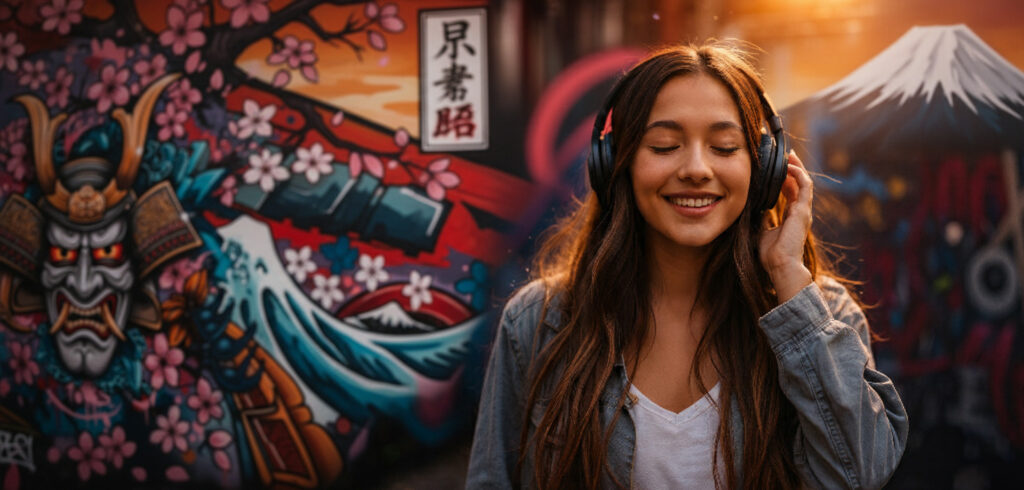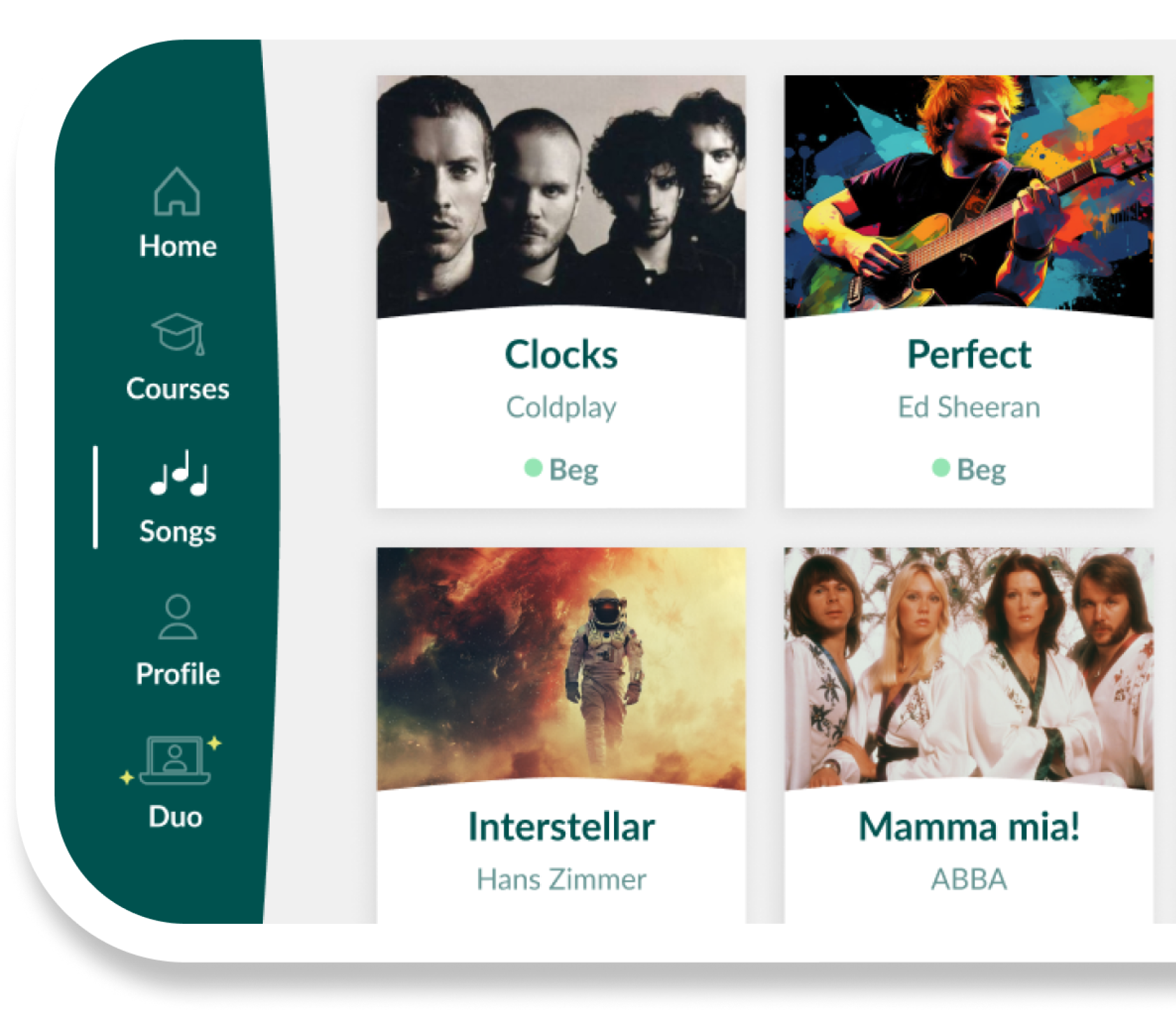While American pop dominates global charts, Japan remains unusually resistant. As the world’s second-largest music market by revenue, 81% of Japan’s Spotify Top 200 features local acts, ranking 5th globally among 73 nations for musical sovereignty, ahead of the United States itself.
The data reveals a fascinating contrast: Japan, famous for its cultural exports from anime to J-Pop, maintains a highly resistant domestic music market. While Japanese music barely registers on global charts, foreign artists struggle for relevance in Tokyo. Even Taylor Swift, who dominates charts from Stockholm to São Paulo, barely impacts Japan’s Spotify Top 200.
Yet one foreign market has carved out a unique foothold: South Korea claims 14.5% of Japan’s Spotify charts, nearly five times the American share. Eight of Japan’s top 10 international artists are Korean, with K-Pop acts like NewJeans and Aespa outperforming Western superstars.
To understand these patterns, the piano learning app Skoove partnered with DataPulse Research to analyze over a year of Spotify Top 200 data across 73 countries, tracking more than 800,000 data points to reveal how local music ecosystems thrive or collapse in the streaming era.
Platform context: Spotify launched in Japan in 2016 and holds approximately 24% of the streaming market, alongside domestic platforms LINE Music (13%) and AWA (10%). This analysis focuses on Spotify’s Top 200 data and may not reflect broader Japanese music consumption patterns.
Mrs. GREEN APPLE's unprecedented chart dominance
One band towers above Japan's music landscape: Mrs. GREEN APPLE commands nearly 16% of the nation's Spotify Top 200 presence: an unusually high share for a single act, surpassing even BTS members' individual shares in South Korea. Billboard Japan's 2024 mid-year charts confirmed their dominance across multiple categories, including top positions on both singles and albums charts.
The rock-pop trio, originally formed in 2013, has mastered Japan's unique blend of digital and physical success. Their songs serve as theme music for popular anime and dramas, exemplifying how anime tie-ins drive chart success. Mrs. GREEN APPLE bridges traditional CD sales with streaming accessibility, showing how physical and digital strategies reinforce each other in Japan's unique market.
Japan's music landscape: Local heroes vs. global stars
Share of Japan's Spotify Top 200 by artist
15.9%
7.5%
4.5%
3.4%
2.9%
2.7%
2.5%
2.4%
2.3%
2.3%
2.0%
1.4%
1.2%
0.8%
International Artists
K-Pop: The exception to Japan's insularity
While Japan resists Western pop culture, South Korean artists have carved out significant space on Spotify. K-Pop claims 14.5% of Japan's Top 200, nearly five times the American share. This represents a striking reversal of historical cultural flows between the two nations.
Eight of Japan's top 10 international artists are Korean, led by Yuuri (2.3%), NewJeans (1.4%), and Aespa (1.2%). Only Bruno Mars and Latto break this Korean dominance among foreign acts. The success reflects deliberate market strategies developed since SM Entertainment sent BoA to Japan in 2001: K-Pop groups often release Japanese-language versions, maintain separate Japanese social media accounts, and prioritize Tokyo in their tour schedules. This targeted approach has made K-Pop the clear exception to Japan's resistance to foreign music.
Physical media's digital echo: How CD culture shapes streaming
Despite the limited availability of streaming services, Japan remains the world's second-largest music market. Physical CDs still generate around two-thirds of Japan's music revenue, compared to just 10% in the United States. This reflects a fan economy where CDs include ballots, tickets, and incentives that encourage multi-copy purchases, sustaining loyalty that carries into streaming patterns.
The streaming patterns reflect these physical buying habits. Mrs. GREEN APPLE's digital dominance mirrors their CD sales success. Many artists who master both formats, offering tangible fan experiences alongside streaming accessibility, capture disproportionate market share. This dual-track success model remains unique to Japan among developed markets.
The transformation from physical to digital distribution fundamentally changes how artists build careers and reach audiences. Scottish musician Graeme Clark from Wet Wet Wet reflects on this seismic shift in the industry:

"The game has completely changed. It used to be about building a following, town by town, with your sound echoing in local clubs. Now, the echo chamber is a global playlist. You're not trying to win over a city anymore; you're trying to please an algorithm. It's a fantastic way to reach the entire world, but you have to wonder what unique sounds get lost in that global translation."
Clark's insight about unique sounds potentially getting lost in global translation highlights a fascinating paradox in Japan's case. While much of the world has seen local sounds diluted by algorithmic recommendations favoring international hits, Japan's unique market dynamics — from strong physical media culture to language barriers — have created a natural resistance to this homogenization. The very factors that keep Japan insular on streaming platforms also preserve its distinct musical identity.
US superstars hit a cultural wall
The United States claims just 3.09% of Japan's Spotify Top 200: one of the lowest presence globally. For context, American music captures 76% of Canada's charts, 69% of Australia's, and even 16% of South Korea's. Japan's resistance to Anglo-American pop represents a striking cultural barrier in an increasingly globalized music landscape.
Global superstars barely register on Japan's Spotify charts: Taylor Swift, who dominates worldwide, struggles for relevance in Tokyo. Ed Sheeran and other artists who define global streaming remain peripheral to Japanese listeners on the platform. Only Bruno Mars, with his retro soul appeal and consistent touring presence, has achieved modest traction at 0.8% of Japan's Spotify chart presence.
Methodology
The study analyzed data from the top 200 songs streamed weekly on Spotify across all 73 countries where Spotify publishes Top 200 charts. The data covers every week from May 23, 2024, to July 10, 2025.
We analyzed chart performance using a points system: The No. 1 song received 200 points, No. 2 received 199 points, and so on. This allows us to weight chart position appropriately - a #1 hit counts more than a #200 track. The percentages shown throughout this report represent each country's or artist's share of total points, which effectively measures their share of Top 200 streaming activity weighted by chart position.
For songs with multiple artists, every artist on the track received the full points for that rank. For example, if a number one song featured three artists, each of those three artists was awarded 200 points.
Artists were analyzed by their country of origin, not the location of their record label, agents, or other business affiliations.
For complete details on our data collection and analysis methods, read the full methodology here.
Study by: Skoove & DataPulse Research
Edited by: Susana Pérez Posada

With over seven years of piano education and a deep passion for music therapy, Susana brings a unique blend of expertise to Skoove. A graduate in Music Therapy from SRH Hochschule Heidelberg and an experienced classical pianist from Universidad EAFIT, she infuses her teaching with a holistic approach that transcends traditional piano lessons. Susana's writings for Skoove combine her rich musical knowledge with engaging storytelling, enriching the learning experience for pianists of all levels. Away from the piano, she loves exploring new places and immersing herself in a good book, believing these diverse experiences enhance her creative teaching style.
Feel free to use this content
This content, including images and data visualizations, is licensed under a Creative Commons Attribution-ShareAlike 4.0 International License. You are free to share, copy, redistribute, adapt, remix, and transform the material for any purpose, even commercially, as long as you provide proper attribution. Please credit and link to: Skoove.com when using any part of this content.















